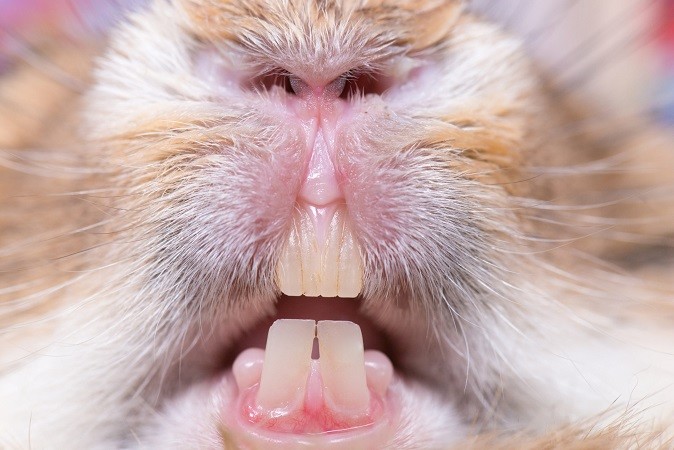

Rabbits’ teeth are part of a complex digestive system that promotes efficient assimilation of plant materials that are indigestible to many other species. The front teeth include four sharp, chisel-like incisors: two on the top and two on the bottom. Behind the upper front teeth are two smaller peg incisors. When a rabbit is at rest, the bottom incisors nestle on the peg incisors, behind the lower edge of the upper front teeth.
Rabbits use their incisors to slice food, and the tongue moves the food into the mouth. The molars, moving in a lateral arc, grind the food on one side of the jaw at a time.One of the most important features of the teeth is that they grow continuously throughout the rabbit’s lifetime. Teeth in healthy rabbits are properly worn down by the ingestion of rough plant materials. It’s important for a rabbit’s teeth to retain their proper length, shape, and alignment. When tooth wear is decreased or abnormal, the risk of dental problems increases. Some of these problems include;
Abscesses
Facial abscesses are most commonly associated with dental disease. Because they are serious and often difficult to treat, it’s important to consult with an experienced veterinarian.
Fractures
Fractures are serious injuries that can lead to other problems, including damage to apexes (and resulting abnormal tooth growth) as well as abscesses. Incisors may fracture during a fall or when a rabbit sustains some other head injury. When teeth are overgrown, they are more prone to fracture.
Spurs and Spikes
When cheek teeth are not wearing evenly, they form spurs or spikes that can lacerate the rabbit’s tongue, cheeks, and other soft mouth tissue. Though it may seem that a tiny, sharp point on a tooth would not cause serious problems, the opposite is true. As a rabbit tries to avoid use of a particular tooth, abnormal pressure is put on other teeth and the uneven wear becomes even greater. In addition, an abscess may form in the soft tissue.
Remember that a rabbit’s teeth are continuously growing. Therefore, the abnormal pressure of misaligned teeth on the other teeth is cause for discomfort. Additionally, the avoidance of one or more teeth can change the way a rabbit’s jaw normally rotates when eating food. Thus, what may seem like a small problem has the potential of negatively affecting the entire mouth (e.g., other teeth, muscles, ligaments).
Malocclusions
Malocclusion (misalignment) of the incisors is a noticeable problem. Molar malocclusion generally isn’t noticed until a rabbit begins to exhibit signs of distress or the rabbit is brought in for incisor treatment. Keep in mind that incisor overgrowth affects proper working of the jaw, thus impacting the health of the cheek teeth (and vice versa). If your rabbit has incisor problems, it is important to have cheek teeth checked regularly because it is unlikely that changes to molar alignment, shape, and growth will be visible in the early stages.
 Contact Jaguza Support
Contact Jaguza Support